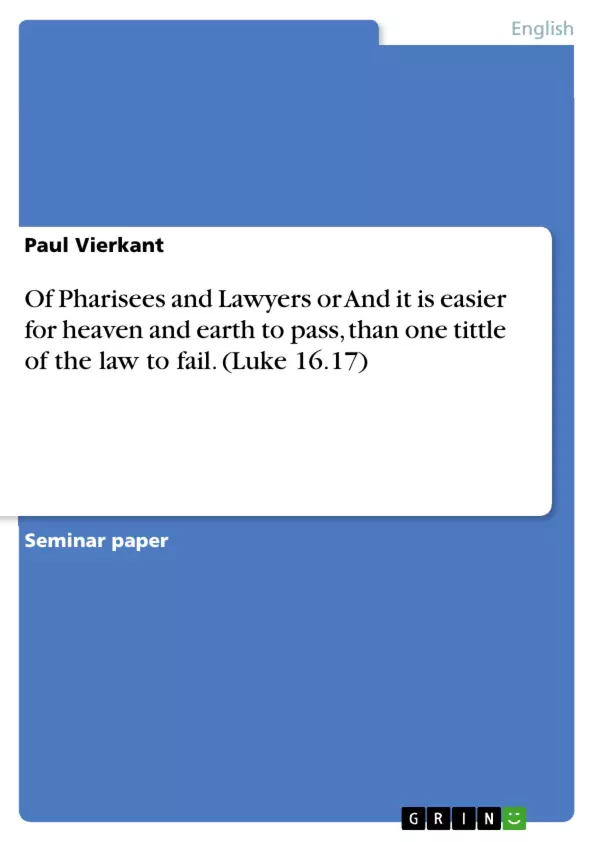The following essay will deal with religion, law and politics in the USA. Because it is a broad topic, I will concentrate on the discourse about accommodation, or separation of state and church in America, with a focus on Stephen L. Carter – a distinguished law professor at Yale University. My thesis is that although Carter claims to be a separatist, his contradictory and biased arguments in most of his books indicate his accommodationist position. His methods are the dichotomization of church and state; his claim that society victimizes religion (his strange comparison of the Civil Rights movement and the Anti-Abortion movement); his assertion that religious people are oppressed by the majority (which according to him is religious), the Supreme Court, and American politics. Carter further maintains that religion is trivialized and privatized. His biased view on law is visible in the cases he discusses (predominantly separatist cases). His suggestive and popular style, as well as his constant references to God’s will and his opinion that the Bible justifies almost everything, makes his argumentation nearly untouchable. Finally, I will show that Carter clearly holds God above the state and thus, his claim as a separatist cannot be maintained.
Inhaltsverzeichnis (Table of Contents)
- I. Introduction
- II. Carter's Definition of Religion, Separatism and Accommodationism
- III. Methods of Argumentation and Their Contradictions
- a. Dichotomization
- b. The Victimization of Religion
- c. Oppressors
- d. Trivialization and Privatization
- IV. Carter and the Supreme Court
- a. Special Cases
- V. Carter's manipulation techniques
- VI. Religion Prior to the State
- VII. Conclusion
Zielsetzung und Themenschwerpunkte (Objectives and Key Themes)
This essay examines the complex relationship between religion, law, and politics in the United States, particularly focusing on the work of Stephen L. Carter, a prominent law professor at Yale University. The essay aims to demonstrate that despite Carter's self-proclaimed separatist stance, his arguments often lean towards accommodationism, using a variety of methods to justify this position.
- Carter's definition of religion and its impact on his analysis
- Methods of argumentation employed by Carter and their contradictions
- Carter's perspective on the Supreme Court and its role in the relationship between religion and state
- Carter's writing style and his use of religious arguments to support his claims
- The implications of Carter's views on the separation of church and state
Zusammenfassung der Kapitel (Chapter Summaries)
- I. Introduction: This chapter sets the stage for the essay, highlighting the enduring significance of the relationship between religion, law, and politics in the United States. It introduces Stephen L. Carter as a key figure in this discourse and suggests that his apparent commitment to separation of church and state is often contradicted by his arguments.
- II. Carter's Definition of Religion, Separatism and Accommodationism: This chapter delves into Carter's definition of religion, arguing that it undermines the possibility of rational critique by positioning religious belief outside the realm of scientific understanding. It then contrasts this definition with Carter's later statements suggesting that religion can act as a subversive force against the state, hinting at a more accommodationist stance.
- III. Methods of Argumentation and Their Contradictions: This chapter explores Carter's methods of argumentation, focusing on his use of dichotomies, claims of victimization, and his portrayal of religious people as oppressed by society, the Supreme Court, and politics. It also analyzes his tendency to trivialize and privatize religion.
- IV. Carter and the Supreme Court: This chapter examines Carter's perspective on the Supreme Court, highlighting his selective choice of cases and his criticisms of the court's failure to define religion adequately.
Schlüsselwörter (Keywords)
This essay focuses on the complex relationship between religion, law, and politics in the United States. Key themes include the separation of church and state, accommodationism, Stephen L. Carter's arguments, the Supreme Court, religious rights, and the role of religion in American society.
Frequently Asked Questions
What is Stephen L. Carter's stance on church and state?
Although Stephen L. Carter claims to be a separatist, the analysis suggests his arguments often align with an accommodationist position, placing religious authority above state law.
How does Carter define religion?
Carter views religion as a subversive force that exists outside of scientific understanding, often portraying it as being victimized or trivialized by modern society.
What are Carter's main methods of argumentation?
He uses dichotomization of church and state, claims of religious oppression by the majority, and comparisons between the Civil Rights and Anti-Abortion movements.
What is the "trivialization of religion" according to Carter?
It refers to his belief that American politics and the Supreme Court treat religious belief as a private hobby rather than a fundamental aspect of human identity and law.
Does Carter prioritize God or the State?
The essay concludes that Carter holds God's will above the authority of the state, which contradicts his self-identification as a strict separatist.
- Quote paper
- Paul Vierkant (Author), 2005, Of Pharisees and Lawyers or And it is easier for heaven and earth to pass, than one tittle of the law to fail. (Luke 16.17) , Munich, GRIN Verlag, https://www.grin.com/document/60882



